现代英语词汇学概论
- 格式:pptx
- 大小:261.58 KB
- 文档页数:86
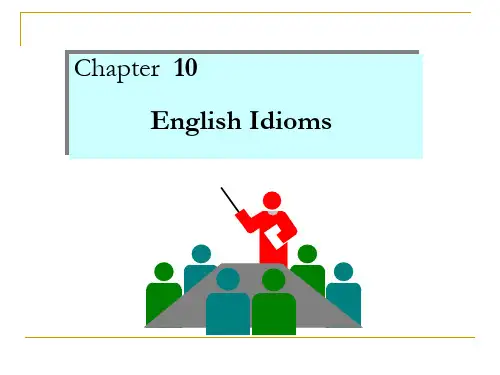
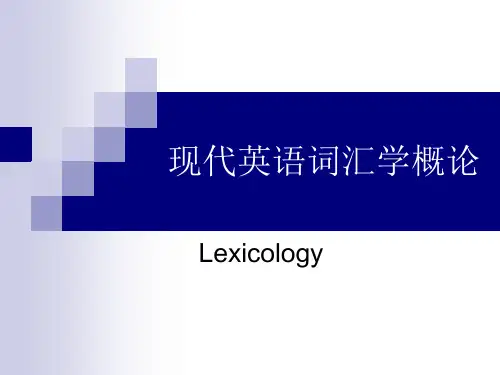
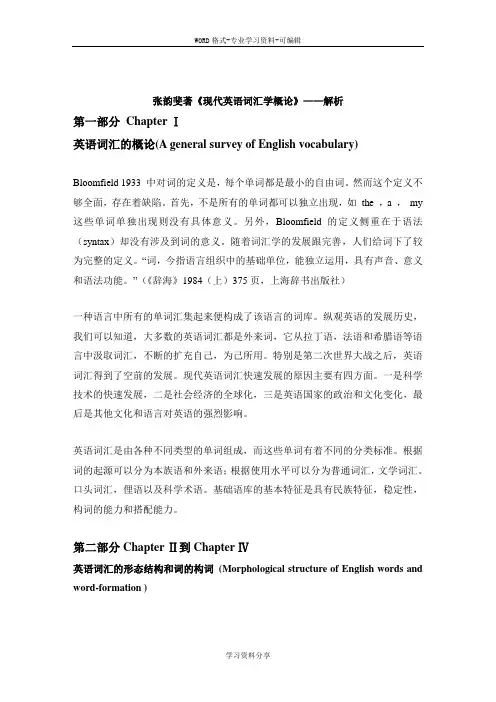
张韵斐著《现代英语词汇学概论》——解析第一部分Chapter Ⅰ英语词汇的概论(A general survey of English vocabulary)Bloomfield 1933 中对词的定义是,每个单词都是最小的自由词。
然而这个定义不够全面,存在着缺陷。
首先,不是所有的单词都可以独立出现,如the ,a ,my 这些单词单独出现则没有具体意义。
另外,Bloomfield的定义侧重在于语法(syntax)却没有涉及到词的意义。
随着词汇学的发展跟完善,人们给词下了较为完整的定义。
“词,今指语言组织中的基础单位,能独立运用,具有声音、意义和语法功能。
”(《辞海》1984(上)375页,上海辞书出版社)一种语言中所有的单词汇集起来便构成了该语言的词库。
纵观英语的发展历史,我们可以知道,大多数的英语词汇都是外来词,它从拉丁语,法语和希腊语等语言中汲取词汇,不断的扩充自己,为己所用。
特别是第二次世界大战之后,英语词汇得到了空前的发展。
现代英语词汇快速发展的原因主要有四方面。
一是科学技术的快速发展,二是社会经济的全球化,三是英语国家的政治和文化变化,最后是其他文化和语言对英语的强烈影响。
英语词汇是由各种不同类型的单词组成,而这些单词有着不同的分类标准。
根据词的起源可以分为本族语和外来语;根据使用水平可以分为普通词汇,文学词汇。
口头词汇,俚语以及科学术语。
基础语库的基本特征是具有民族特征,稳定性,构词的能力和搭配能力。
第二部分Chapter Ⅱ到Chapter Ⅳ英语词汇的形态结构和词的构词(Morphological structure of English words and word-formation )(一)词素(Morphemes)单词是有词素(morphemes)构成的。
词素即英语语言中有意义的最小单位,同时具有声音和意义。
单词可以有一个或一个以上的词素组成。
如:nation 是一个词素,national有nation+al 两个词素。
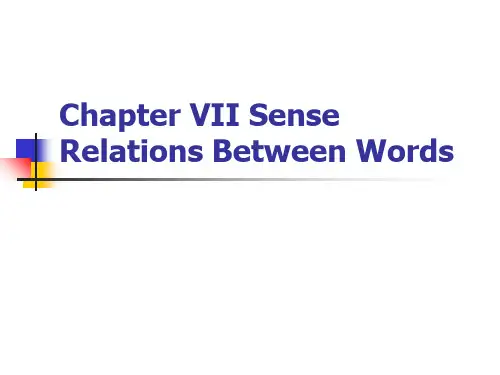

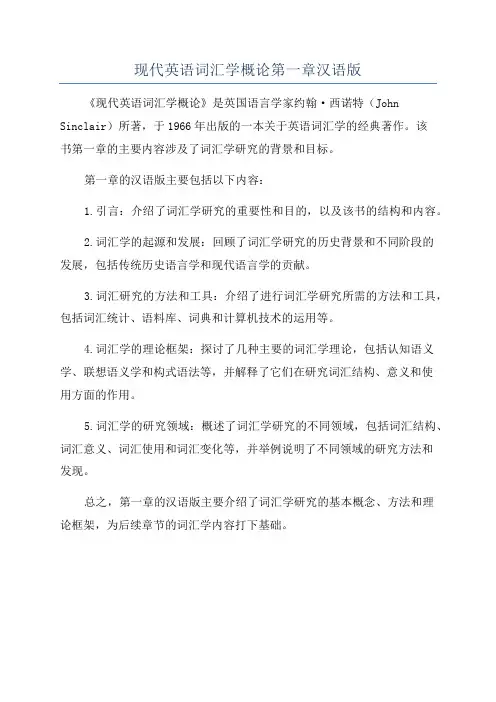
现代英语词汇学概论第一章汉语版
《现代英语词汇学概论》是英国语言学家约翰·西诺特(John Sinclair)所著,于1966年出版的一本关于英语词汇学的经典著作。
该
书第一章的主要内容涉及了词汇学研究的背景和目标。
第一章的汉语版主要包括以下内容:
1.引言:介绍了词汇学研究的重要性和目的,以及该书的结构和内容。
2.词汇学的起源和发展:回顾了词汇学研究的历史背景和不同阶段的
发展,包括传统历史语言学和现代语言学的贡献。
3.词汇研究的方法和工具:介绍了进行词汇学研究所需的方法和工具,包括词汇统计、语料库、词典和计算机技术的运用等。
4.词汇学的理论框架:探讨了几种主要的词汇学理论,包括认知语义学、联想语义学和构式语法等,并解释了它们在研究词汇结构、意义和使
用方面的作用。
5.词汇学的研究领域:概述了词汇学研究的不同领域,包括词汇结构、词汇意义、词汇使用和词汇变化等,并举例说明了不同领域的研究方法和
发现。
总之,第一章的汉语版主要介绍了词汇学研究的基本概念、方法和理
论框架,为后续章节的词汇学内容打下基础。
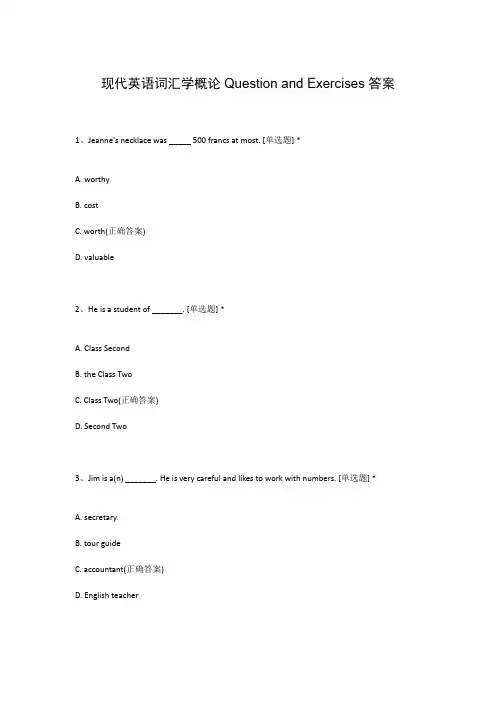
现代英语词汇学概论Question and Exercises答案1、Jeanne's necklace was _____ 500 francs at most. [单选题] *A. worthyB. costC. worth(正确答案)D. valuable2、He is a student of _______. [单选题] *A. Class SecondB. the Class TwoC. Class Two(正确答案)D. Second Two3、Jim is a(n) _______. He is very careful and likes to work with numbers. [单选题] *A. secretaryB. tour guideC. accountant(正确答案)D. English teacher4、4.—Alice’s never late for school.—________. [单选题] *A.So am I.B.So was I.C.Neither am I. (正确答案)D.Neither have I.5、We need some green paint badly, but there' s _____ at hand. [单选题] *A. notB. nothingC. little(正确答案)D. none6、Finally he had to break his promise. [单选题] *A. 计划B. 花瓶C. 习惯D. 诺言(正确答案)7、Something must be wrong with the girl’s _______. She can’t hear clearly. [单选题] *A. ears(正确答案)B. noseC. armsD. eyes8、Will you please say it again? I _______ you. [单选题] *A. didn’t hear(正确答案)B. don’t heardC. didn’t heardD. don’t hear9、There _______ some milk in the glass. [单选题] *A. is(正确答案)B. areC. haveD. has10、He can’t meet his friends tonight because he _______ do homework. [单选题] *A. has to(正确答案)B. needC. have toD. don’t have to11、98.There is a post office ______ the fruit shop and the hospital. [单选题] *A.atB.withC.between(正确答案)D.among12、95.-Dad, can we walk? ? ? ? ? ? ?the road now?-No,we? ? ? ? ? ? ? ? ? ? . We have to wait until the light turns green. [单选题] *A.across, needn’tB.across, mustn’t(正确答案)C.though, can’tD.through, mustn't13、58.—How much is Lucy's skirt?—She________320 yuan for it. I think it's a little dear. [单选题] *A.tookB.paid(正确答案)C.spentD.bought14、—Why is Mary asking Bob about the school trip? —Because she wants to know ______.()[单选题] *A. how does he think of the tripB. what does he think of the tripC. what he likes the tripD. how he likes the trip(正确答案)15、It was difficult to guess what her_____to the news would be. [单选题] *A.impressionmentC.reaction(正确答案)D.opinion16、There are still some wild tigers alive. [单选题] *A. 聪明的B. 凶恶的C. 野生的(正确答案)D. 珍贵的17、If it _______ tomorrow, I won’t go there. [单选题] *A. rains(正确答案)B. is rainingC. will rainD. would rain18、Jim wants to hang out with his friends at night, but his parents don’t allow him ______ so. ()[单选题] *A. doB. doneC. to do(正确答案)D. doing19、I think ______ time with my friends is fun for me.()[单选题] *A. spendB. spendC. spending(正确答案)D. spent20、In fact, Beethoven did something brave than dying. [单选题] *A. 勇敢(正确答案)B. 冒险C. 可怕D. 奇妙21、—I can’t always get good grades. What should I do?—The more ______ you are under, the worse grades you may get. So take it easy!()[单选题] *A. wasteB. interestC. stress(正确答案)D. fairness22、I live a very quiet and peaceful life. [单选题] *A. 宁静的(正确答案)B. 舒适的C. 和平的D. 浪漫的23、—______is my notebook?—Look! It’s in your schoolbag.()[单选题] *A. WhatB. WhichC. Where(正确答案)D. How24、Almost every one of us could see her anxiety from the()on her face. [单选题] *A. appearanceB. feelingC. movementD. expression(正确答案)25、Mr. Brown ______ the football match next week.()[单选题] *A. is seeingB. seesC. sawD. is going to see(正确答案)26、--Do you have a _______?--Yes, I _______ at a clothes store. [单选题] *A. work; workB. work; jobC. job; jobD. job; work(正确答案)27、His mother’s _______ was a great blow to him. [单选题] *A. diedB. deadC. death(正确答案)D. die28、1——May I help you? You seem to be having some problems.——_______ , thanks. Ithink I can manage. [单选题] *A. All rightB. No problemC. It’s all right(正确答案)D. There’s no way29、A survey of the opinions of students()that they admit several hours of sitting in front of the computer harmful to health. [单选题] *A. show;areB. shows ;is(正确答案)C.show;isD.shows ;are30、You’d ______ give up smoking. [单选题] *A. goodB. wellC. better(正确答案)D. best。
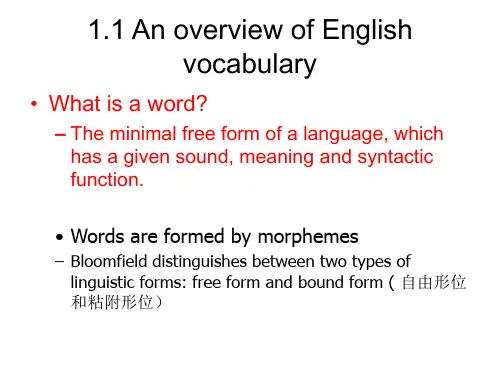

词汇学考试大纲一、判断(10)二、选择(20)三、搭配(10)pound 复合构词法sit-in 代理,参加dropout 退学学生phone-in 听众热线电话直播节目breakdown 失败walk-on 跑龙套员walkout 徒步旅行take-off 起飞astray 烟灰缸 a tray for ash moonwalk a walk on the moonB.Deriverd word 派生法be(= off,from)adj. belittle 贬低de (=to remove) n. debug 除错brotherhood 兄弟情义friendship 友谊happilyC.Converted word 词类转化法He interned in the Capital Hospital.He served as an intern in the Capital Hospital.实习生D.Initialisms 首字母连写法VIP = for a very important personE.Acronyms 首字母拼音法TEFLRadar radio detecting and rangingF.Clipped word 略写ad. (=advertisement)amp(=ampere)plane(=airplane)G.Blend 拼缀词talk + marathon = talkathon 冗长的演说medical+care=medicare 医疗保险H.Back-formationhouse-sit = house sitter 看管房屋的人housekeep 自立门户,主持家务I.Words from proper nameschina 瓷器japan 漆器champagne 香槟J.Onomatopoeic word 拟声词K.Reduplication 重叠词go-go 戈戈舞的ping-pong四、名词解释(4,20分)1、context in its narrowest senseContext in its narrow sense consists of the lexical items that come immediately before andafter any word in an act of communication.For instance,the verb make is often used in the sense of constructing something by putting materials together,as in,She made coffee for all of us.I got a letter today.2、homophones/homographsWords identical in sound but different in spelling and meaning are called homophones.pair,pear son,sunWord identical in spelling but different in sound and meaning are called homographslead v.n. tear n.v.3、semantic field (P143)Semantic field theory is concerned with the vocabulary of a language as a system of interrelated lexical networks.The words of a semantic field are joined together by a common concept,and they are likely to have a number of collocation in common.Hence we can see that meaning resides not only in a word itself,but spreads over neighbouring word as well.Only the neighbouring words can identify the semantic field,in which we have related words which enable us to determine the meaning of the word used.One can hardly tell the meaning of I like lemon until he knows the semantic field in which lemon operates.4、allomorphs/morpheme (P21)A morpheme may take various shapes or forms.For example,the inflectionalmorpheme-(e)s of books,pigs,horses has the same meaning ‘more than one’,yet it has three different phonological forms: /-s,-z,-iz/.The three forms are variants of the same morpheme-s .They are called allomorphs.The morpheme is the smallest meaningful lingusitic unit of language,not divisible or analyzable into smaller forms.One morpheme nationTwo morphemes nation+alThree morpheme nation+al+ize5、connotative meaning (P98)Connotative meaning refers to the emotional association which a word or a phrase suggests in one’s mind.For instance,the denotative meaning of the word mother is female parent ,but it generally connotes love,care,and tenderness.6.verbal context in its broad sense (P154)In additon to lexical,and grammatical context ,the verbal context,in its broadest sense,may cover an entire passage,or even an entire book,and in some cases even the entire social or culture setting ,as stated at the beginning of the chapter.7、semantic motivationSemantic motivation refers to motivation based on semantic factor.It is a kind of mental association.When we speak of a stony heart we are comparing the heart with a stone五、简单题(2,20分)1、What is motivation?How are English words motivated?Motivation refers to the connection between word-symbol and its sense.Motivation can arise in three major ways:1.phonetic motivation,like miaow of the cat,the baa-baa of amotivation,like good-looking,headache, motivation ,When we speak of a stony heart we are comparing the heart with a stone.2、There are several main types of word meaning list and explain. (P95)A.Grammatical meaningGrammatical meaning consists of word-class and inflectional paradigm.1.word classMorden will be marked as an adjective,mordernize as a verb and mordernization as a noun.2.inflectional paradigmto walk,walks walked,to write,writes,wrote,writtenB.Lexical meaning1.denotative meaningThe denotative meaning of a word is its definitin given in a dictionary.It is that aspect of lexical meaning which makes communication possible.2.connotative meaningThe denotative meaning of the word mother is female parent but it generally connotes love,care,and tenderness.3.social or stylistic meaningFormal,informal,neural4.affective meaningAffective meaning is concerned with the expression of feeling and attitudes of the speaker or writer.3、How do we classify words by level of usage?(p11)mon wordsCommon words are words connected with the ordinary things or activities necessary to everyday life.For example,the repeated telephone calls only annoyed me but made my sister angry.All the words in the sentences are common words,and so this sentence could be used in both speech and writing,and on formal or informal occasions.2.literary wordsLiterary words are chiefly used in writing,especially in books written in a more elevated style,in official documents,or in formal speeches.3.colloquial wordsIn contrast with literary words,colloquial words or expressions are used mainly in spoken English,as in conversation among friends and colleagues.Tom felt so dog-tired he hit the sack early.(colloquial)4.slang wordsA slang usage is not generally used in informal conversation.5.technical wordsTechnical words refers to those words used in various specail fields.4、Make a tree diagram to arrage the following words in order of hyponymy.foodmeat vegetable fruitbeef pork mutton cabbage(卷心菜)spinach(菠菜)celery(芹菜) apple orange peach 5、Cite ONE example to illustrate what grammatical meaning is .1.word-class2.inflectional paradigm六、问答题(20分)1.The word “accident” once meant “an occurrence, an event”but it now means “an unplannedor chance event with unfortuante consequences”Analyze which type of change in meaning this belong to,why?Then list and explain the types of word-meaning changes.1.判断类型2.neutral word …been degarded into …3.four types 先罗列类型,然后分别解释并举例(每一种形式举一个词即可)举例形式参考The word “accident” once meant “an occurrence, an event”but it now means “an unplanned or chance event with unfortuante consequences”A.restriction of meaning (specialization)Restrition of meaning means that a word of wide meaning acquires a narrower,specialized sense which is applicable to only one of the objects it had previously denoted.The word “wife” once meant “woman”but it now means “married woman,in relation to her husband”B.extension of meaning(generalization)Extension of meaning,the opposite of restriction,means the widening of a word’s sense until it covers much more than what it originally conveyed.The word “picture” once meant “a paining” but it nows means “painting,drawing ,sketch ofa work of art;photographs and movies are also included”C.degeneration 衰退of meaning(pejoration 贬低)The two main forms of degenration are:1.The falling of word meaning into disrepute名誉坏,for one reason or another.Words oncerespectable or neutral [ˈnju:trəl] may shift to a less respectable ,or even derogatory [diˈr ɔgətəri] meaning.The word “silly” once meant “blessed and happy”now means “foolish”2.The second form of degeneration “may take the form of the gradual逐渐的extension to somany senses that any particular meaning which a word may have had is completely lost”. Lovely attractively or admirable beautiful now means it is used in collocation with almost any object ,such as a lovely girl/day/weather/dinner/car or chair.D.elevation高度of meaning (amelioration改善)Fond foolish now means tender and affectionate。
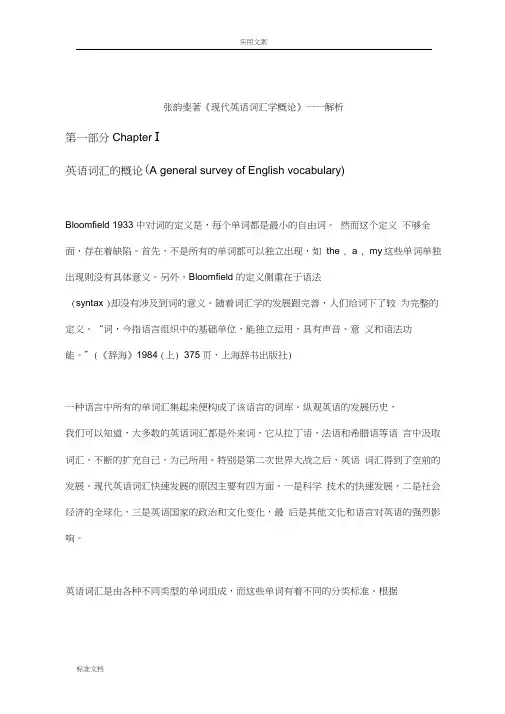
张韵斐著《现代英语词汇学概论》一一解析第一部分Chapter I英语词汇的概论(A general survey of English vocabulary)Bloomfield 1933 中对词的定义是,每个单词都是最小的自由词。
然而这个定义不够全面,存在着缺陷。
首先,不是所有的单词都可以独立出现,如the , a , my这些单词单独出现则没有具体意义。
另外,Bloomfield 的定义侧重在于语法(syntax )却没有涉及到词的意义。
随着词汇学的发展跟完善,人们给词下了较为完整的定义。
“词,今指语言组织中的基础单位,能独立运用,具有声音、意义和语法功能。
”(《辞海》1984 (上) 375页,上海辞书出版社)一种语言中所有的单词汇集起来便构成了该语言的词库。
纵观英语的发展历史,我们可以知道,大多数的英语词汇都是外来词,它从拉丁语,法语和希腊语等语言中汲取词汇,不断的扩充自己,为己所用。
特别是第二次世界大战之后,英语词汇得到了空前的发展。
现代英语词汇快速发展的原因主要有四方面。
一是科学技术的快速发展,二是社会经济的全球化,三是英语国家的政治和文化变化,最后是其他文化和语言对英语的强烈影响。
英语词汇是由各种不同类型的单词组成,而这些单词有着不同的分类标准。
根据词的起源可以分为本族语和外来语;根据使用水平可以分为普通词汇,文学词汇。
口头词汇,俚语以及科学术语。
基础语库的基本特征是具有民族特征,稳定性,构词的能力和搭配能力。
第二部分Chapter H 到Chapter IV英语词汇的形态结构和词的构词(Morphological structure of Englishwords and word-formati on )(一) 词素(Morphemes )单词是有词素(morphemes )构成的。
词素即英语语言中有意义的最小单位,同时具有声音和意义。
单词可以有一个或一个以上的词素组成。
如:n ati on是一个词素,national 有nation+al 两个词素。
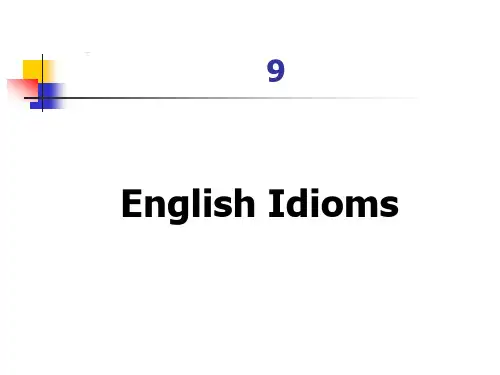
现代英语词汇学概论随着现代社会的发展,现代英语已成为几乎全球范围内最常用的国际语言,因此,学习现代英语的词汇学知识具有重要的意义。
本文将对现代英语词汇学进行概论性介绍,具体内容包括词汇学的定义、其发展历史及其与语言学关系等。
首先,现代英语词汇学是一门使用系统研究法研究词汇知识的学科,以研究词语本身的构成、性质、发生和演变等为研究的核心,旨在揭示英语语言的实质特性和本身的内部结构特征。
其次,现代英语词汇学的发展史相对较晚,可以追溯到19世纪的拉丁语和希腊语研究,到20世纪中叶的中世纪英语研究、词形学和语义学,乃至截止到当代英语语言学的研究。
最后,现代英语词汇学与语言学密切相关。
通过词汇学研究,可以有效地揭示语言的实质性属性、归纳出英语语法规律以及具有指导意义的语言技巧,从而深入了解语言,提升英语水平。
综上所述,现代英语词汇学是一门涉及英语词汇系统研究及其它语言学知识的研究学科,它的研究可以帮助我们了解英语的实质特性、语言结构和语言技巧,从而能够有效地提升英语水平。
现代英语词汇学的研究方法主要包括分类法、历史方法、概率法、系统语用分析法等。
通过这些研究方法,可以有效地揭示词义的内在联系,不仅可以有效理解和记忆单词,还可以有效掌握英语的技巧。
例如,分类法可以有效地将单词分类组合,以便于记忆和理解;通过历史方法,可以更好地理解英语变化的规律,掌握固定搭配和表达方式;而通过概率法,可以有效地把握单词的使用倾向及相关熟词。
系统语用分析法则可以有效地把握语篇表达的价值观,例如把握上下文和情境,从而掌握英语表达方法。
从上述内容可以看出,现代英语词汇学对于英语学习者有很重要的教育意义,它可以帮助我们了解英语的实质特性、把握语言结构及其它知识,从而更好地提升我们的英语水平。
张韵斐著《现代英语词汇学概论》——解析第一部分Chapter Ⅰ英语词汇得概论(Ageneralsurvey ofEnglish vocabu lary)Bloomfield1933中对词得定义就是,每个单词都就是最小得自由词.然而这个定义不够全面,存在着缺陷。
首先,不就是所有得单词都可以独立出现,如the ,a ,my 这些单词单独出现则没有具体意义.另外,Bloomfield得定义侧重在于语法(syntax)却没有涉及到词得意义。
随着词汇学得发展跟完善,人们给词下了较为完整得定义.“词,今指语言组织中得基础单位,能独立运用,具有声音、意义与语法功能。
”(《辞海》1984(上)375页,上海辞书出版社)一种语言中所有得单词汇集起来便构成了该语言得词库。
纵观英语得发展历史,我们可以知道,大多数得英语词汇都就是外来词,它从拉丁语,法语与希腊语等语言中汲取词汇,不断得扩充自己,为己所用.特别就是第二次世界大战之后,英语词汇得到了空前得发展。
现代英语词汇快速发展得原因主要有四方面。
一就是科学技术得快速发展,二就是社会经济得全球化,三就是英语国家得政治与文化变化,最后就是其她文化与语言对英语得强烈影响。
英语词汇就是由各种不同类型得单词组成,而这些单词有着不同得分类标准。
根据词得起源可以分为本族语与外来语;根据使用水平可以分为普通词汇,文学词汇。
口头词汇,俚语以及科学术语.基础语库得基本特征就是具有民族特征,稳定性,构词得能力与搭配能力。
第二部分Chapter Ⅱ到Chapter Ⅳ英语词汇得形态结构与词得构词(Morphologicalstructure of Engli shwords and word—formation)(一)词素(Morphemes)单词就是有词素(morphemes)构成得。
词素即英语语言中有意义得最小单位,同时具有声音与意义.单词可以有一个或一个以上得词素组成。
如:nation就是一个词素,national有nation+al 两个词素。